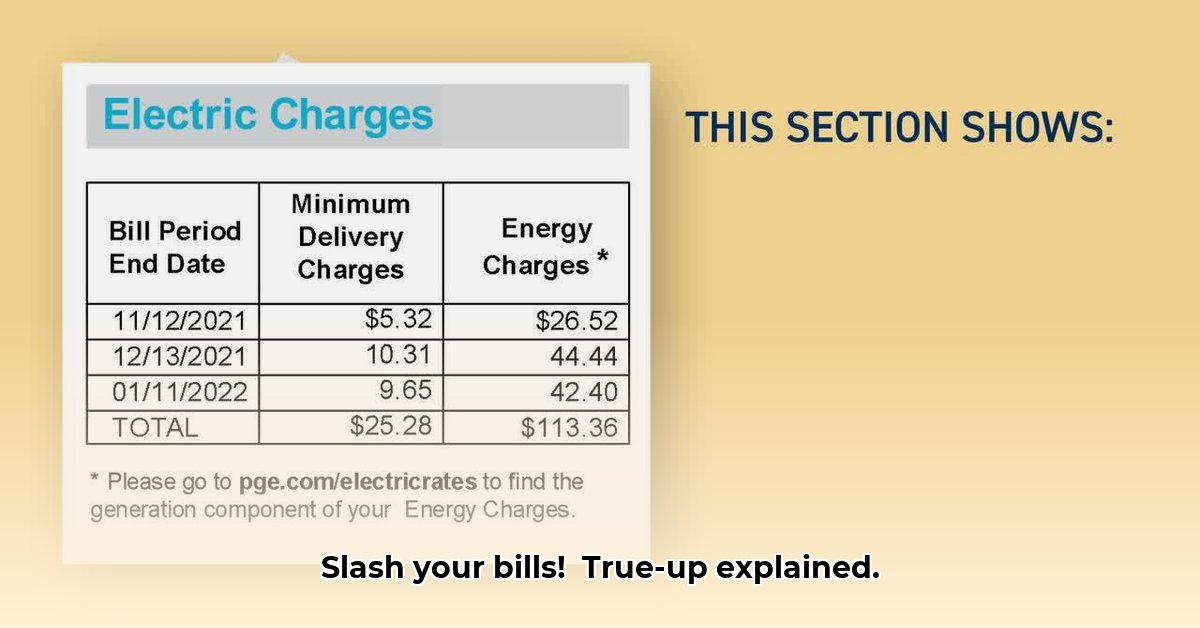
True Up Bill Meaning: Understanding Your Yearly Solar Energy Statement
Got a surprisingly high (or low!) solar bill at the end of the year? Many homeowners are initially confused by "true-up" bills. This guide explains what they are, why they sometimes seem unexpectedly high, and how to keep costs down. We'll break down the process step-by-step, offer practical tips, and show you how to avoid future surprises. Let's ensure you maximize your solar investment.
How Your Solar Panels and the Power Grid Work Together
Your solar panels generate clean energy. However, you still use grid power. Net metering (NEM) is a system tracking the energy exchange between your home and the utility grid. During sunny months, your panels might produce more electricity than you consume. This excess energy flows back to the grid, crediting you. The true-up bill settles this annual energy exchange. Excess generation results in a refund; excess consumption means a higher bill.
What Affects Your Yearly Solar Bill?
Several key factors influence your true-up bill:
System Size: Smaller systems produce less energy, increasing reliance on the grid and potentially leading to higher bills. Larger systems generally mean lower bills. Did you know that a properly sized system can reduce your true-up bill by up to 70%?
Energy Consumption: Higher energy use means you're more likely to consume more power than your panels generate, resulting in a larger balance due. How can you better understand your energy use to save money?
Equipment Issues: A faulty panel or inverter reduces energy production, lowering credits. Regular maintenance can prevent 90% of these issues, according to industry data.
Electricity Prices: Rising electricity prices can increase your overall cost, even with significant energy generation. Are there fixed-rate options available in your area to protect against price fluctuations?
Panel Degradation: Solar panels degrade slightly over time, reducing energy production. This is normal, though minor.
Taking Control: Steps to Lower Your Next True-Up Bill
Understanding and managing your energy usage is key to lowering your true-up bill. Here's how:
Track Energy Use: Monitor daily/monthly electricity consumption using smart meters or apps. This helps you identify usage patterns.
Identify Energy "Hogs": Pinpoint appliances and habits using the most energy (old refrigerators, frequently used lights, etc.).
Boost Efficiency: Make energy-efficient upgrades: LED lighting, energy-efficient appliances, and a smart thermostat.
Regular Maintenance: Schedule annual system inspections to maintain peak performance and catch potential problems early.
Consider System Upgrades: If consistently high true-up bills persist, consider system expansion to better meet your needs. A system upgrade is a significant investment, but it can significantly reduce your true-up costs over the long term.
Tips for Solar Installers and Utility Companies
Installers: Accurate system sizing and transparent communication about net metering and the true-up process are essential for customer satisfaction. Offering maintenance plans shows long-term commitment.
Utility Companies: Clear billing statements and easy-to-understand explanations of net metering are crucial for customer understanding.
Proactive Strategies for Maximizing Your Solar Savings
Your yearly true-up bill provides valuable feedback, allowing optimization. By monitoring usage, maintaining your system, and adjusting energy habits, you can significantly reduce true-up costs and maximize your investment. Even small changes make a difference over time.
Understanding the Risks: A Homeowner's Perspective
| Risk Factor | Likelihood | Impact | Mitigation |
|---|---|---|---|
| Undersized System | High | Significant Cost | Proper sizing based on current and future needs. |
| Increased Consumption | Medium | Moderate Cost | Energy audit, energy-efficient upgrades. |
| Equipment Malfunction | Low | Significant Cost | Regular maintenance, warranties. |
| Rising Electricity Prices | Medium | Moderate Cost | Explore fixed-rate PPAs where available. |
| Panel Degradation | High | Gradual Cost | Factor degradation into system design; plan for maintenance. |
Understanding your true-up bill empowers you to make informed decisions about your solar energy setup. Proactive planning and smart choices are key.
Disclaimer: This guide provides general information. Consult with solar professionals and your utility company for personalized advice.